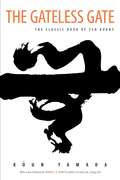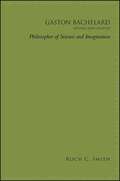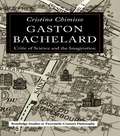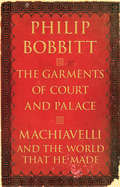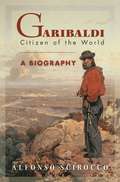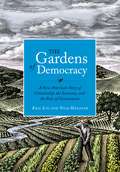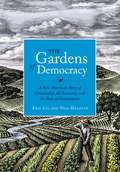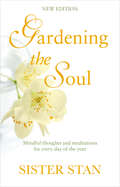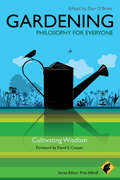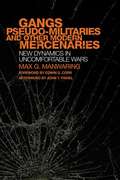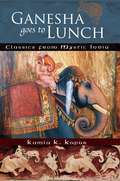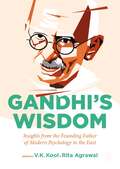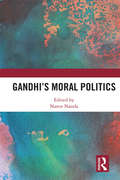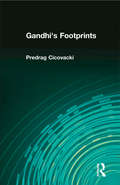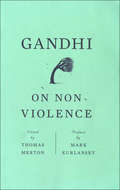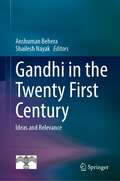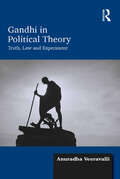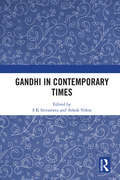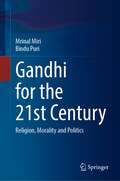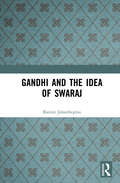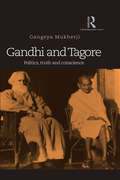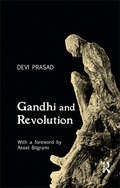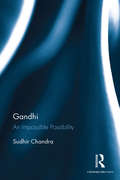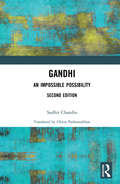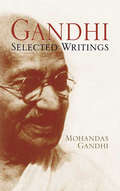- Table View
- List View
The Gateless Gate
by Ruben L. Habito Koun YamadaIn The Gateless Gate, one of modern Zen Buddhism's uniquely influential masters offers classic commentaries on the Mumonkan, one of Zen's greatest collections of teaching stories. This translation was compiled with the Western reader in mind, and includes Koan Yamada's clear and penetrating comments on each case. Yamada played a seminal role in bringing Zen Buddhism to the West from Japan, going on to be the head of the Sanbo Kyodan Zen Community. The Gateless Gate would be invaluable if only for the translation and commentary alone, yet it's loaded with extra material and is a fantastic resource to keep close by: An in-depth Introduction to the History of Zen Practice Lineage charts Japanese-to-Chinese and Chinese-to-Japanese conversion charts for personal names, place names, and names of writings Plus front- and back-matter from ancient and modern figures: Mumon, Shuan, Kubota Ji'un, Taizan Maezumi, Hugo Enomiya-Lasalle, and Yamada Roshi's son, Masamichi Yamada. A wonderful inspiration for the koan practitioner, and for those with a general interest in Zen Buddhism.
Gaston Bachelard, Revised and Updated: Philosopher of Science and Imagination (SUNY series in Contemporary French Thought)
by Roch C. SmithGaston Bachelard, one of twentieth-century France's most original thinkers, is known by English-language readers primarily as the author of The Poetics of Space and several other books on the imagination, but he made significant contributions to the philosophy and history of science. In this book, Roch C. Smith provides a comprehensive introduction to Bachelard's work, demonstrating how his writings on the literary imagination can be better understood in the context of his exploration of how knowledge works in science. After an overview of Bachelard's writings on the scientific mind as it was transformed by relativity, quantum physics, and modern chemistry, Smith examines Bachelard's works on the imagination in light of particular intellectual values Bachelard derived from science. His trajectory from science to a specifically literary imagination is traced by recognizing his concern with what science teaches about how we know, and his increasing preoccupation with questions of being when dealing with poetic imagery. Smith also explores the material and dynamic imagination associated with the four elements—fire, water, air, and earth—and the phenomenology of creative imagination in Bachelard's Poetics of Space, his Poetics of Reverie, and in the fragments of Poetics of Fire.
Gaston Bachelard: Critic of Science and the Imagination (Routledge Studies in Twentieth-Century Philosophy #Vol. 9)
by Cristina ChimissoIn this new study, Cristina Chimisso explores the work of the French Philosopher of Science, Gaston Bachelard (1884-1962) by situating it within French cultural life of the first half of the century. The book is introduced by a study - based on an analysis of portraits and literary representations - of how Bachelard's admirers transformed him into the mythical image of the Philosopher, the Patriarch and the 'Teacher of Happiness'. Such a projected image is contrasted with Bachelard's own conception of philosophy and his personal pedagogical and moral ideas.This pedagogical orientation is a major feature of Bachelard's texts, and one which deepens our understanding of the main philosophical arguments. The primary thesis of the book is based on the examination of the French educational system of the time and of French philosophy taught in schools and conceived by contemporary philosophers. This approach also helps to explain Bachelard's reception of psychoanalysis and his mastery of modern literature. Gaston Bachelard: Critic of Science and the Imagination thus allows for a new reading of Bachelard's body of work, whilst at the same time providing an insight into twentieth century French culture.
The Garments of Court and Palace: Machiavelli and the World That He Made (Books That Shook The World)
by Philip BobbittThe Prince, a political treatise by the Florentine public servant and political theorist Niccolo Machiavelli is widely regarded as the single most influential book on politics-and in particular on the the politics of power-ever written.In this groundbreaking book, Philip Bobbitt explores this often misunderstood work in the context of the time. He describes The Prince as one half of a masterpiece that, along with Machiavelli’s often neglected Discourses prophesies the end of the feudal era and describes the birth of the neoclassicalRenaissance State. Using both Renaissance examples and cases drawn from our current era, Bobbitt situates Machiavelli’s work as a turning point in our understanding of the relation between war and law as these create and maintain the State. This is a fascinating history and commentary by the man Henry Kissinger called "the outstanding political philosopher of our time."
Garibaldi: Citizen of the World: A Biography
by Alfonso SciroccoWhat adventure novelist could have invented the life of Giuseppe Garibaldi? The revolutionary, soldier, politician, and greatest figure in the fight for Italian unification, Garibaldi (1807-1882) brought off almost as many dramatic exploits in the Americas as he did in Europe, becoming an international freedom fighter, earning the title of the "hero of two worlds," and making himself perhaps the most famous and beloved man of his century. Alfonso Scirocco's Garibaldi is the most up-to-date, authoritative, comprehensive, and convincing biography of Garibaldi yet written. In vivid narrative style and unprecedented detail, and drawing on many new sources that shed fresh light on important events, Scirocco tells the full story of Garibaldi's fascinating public and private life, separating its myth-like reality from the outright myths that have surrounded Garibaldi since his own day. Scirocco tells how Garibaldi devoted his energies to the liberation of Italians and other oppressed peoples. Sentenced to death for his role in an abortive Genoese insurrection in 1834, Garibaldi fled to South America, where he joined two successive fights for independence--Rio Grande do Sul's against Brazil and Uruguay's against Argentina. He returned to Italy in 1848 to again fight for Italian independence, leading seven more campaigns, including the spectacular capture of Sicily. During the American Civil War, Abraham Lincoln even offered to make him a general in the Union army. Presenting Garibaldi as a complex and even contradictory figure, Scirocco shows us the pacifist who spent much of his life fighting; the nationalist who advocated European unification; the republican who served a king; and the man who, although compared by contemporaries to Aeneas and Odysseus, refused honors and wealth and spent his last years as a farmer.
The Gardens of Democracy: A New American Story of Citizenship, the Economy, and the Role of Government
by Eric Liu Nick HanauerAmerican democracy is informed by the 18th century's most cutting edge thinking on society, economics, and government. We've learned some things in the intervening 230 years about self interest, social behaviors, and how the world works. Now, authors Eric Liu and Nick Hanauer argue that some fundamental assumptions about citizenship, society, economics, and government need updating. For many years the dominant metaphor for understanding markets and government has been the machine. Liu and Hanauer view democracy not as a machine, but as a garden. A successful garden functions according to the inexorable tendencies of nature, but it also requires goals, regular tending, and an understanding of connected ecosystems. The latest ideas from science, social science, and economics--the cutting-edge ideas of today--generate these simple but revolutionary ideas:True self interest is mutual interest. (Society, it turns out, is an ecosystem that is healthiest when we take care of the whole.)Society becomes how we behave. (The model of citizenship depends on contagious behavior, hence positive behavior begets positive behavior.)We're all better off when we're all better off. (The economy is not an efficient machine. It's an effective garden that need tending. Adjust the definition of wealth to society creating solutions for all.)Government should be about the big what and the little how. (Government should establish the ideas and the goals, and then let the people find the solutions of how to make it happen.)Freedom is responsibility. (True freedom is not about living some variant of libertarianism but rather an active cooperation a part of a big whole society; freedom costs a little freedom.)The Gardens of Democracy is an optimistic, provocative, and timely summons to improve our role as citizens in a democratic society.
The Gardens of Democracy
by Nick Hanauer Eric LiuAmerican democracy is informed by the 18th century’s most cutting edge thinking on society, economics, and government. We’ve learned some things in the intervening 230 years about self interest, social behaviors, and how the world works. Now, authors Eric Liu and Nick Hanauer argue that some fundamental assumptions about citizenship, society, economics, and government need updating. For many years the dominant metaphor for understanding markets and government has been the machine. Liu and Hanauer view democracy not as a machine, but as a garden. A successful garden functions according to the inexorable tendencies of nature, but it also requires goals, regular tending, and an understanding of connected ecosystems. The latest ideas from science, social science, and economics—the cutting-edge ideas of today--generate these simple but revolutionary ideas: True self interest is mutual interest. (Society, it turns out, is an ecosystem that is healthiest when we take care of the whole.) Society becomes how we behave. (The model of citizenship depends on contagious behavior, hence positive behavior begets positive behavior.) We’re all better off when we’re all better off. (The economy is not an efficient machine. It’s an effective garden that need tending. Adjust the definition of wealth to society creating solutions for all.) Government should be about the big what and the little how. (Government should establish the ideas and the goals, and then let the people find the solutions of how to make it happen.) Freedom is responsibility. (True freedom is not about living some variant of libertarianism but rather an active cooperation a part of a big whole society; freedom costs a little freedom.) The Gardens of Democracy is an optimistic, provocative, and timely summons to improve our role as citizens in a democratic society.
Gardening The Soul: Mindful Thoughts and Meditations for Every Day of the Year
by Stanislaus KennedySister Stan, as she is affectionately known, was brought up on a farm in Dingle, County Kerry, one of the most beautiful parts of Ireland. It was there that she learnt to appreciate the earth, its stillness and its energy, its beauty and its bounty.In this hugely powerful and evocative book, Sister Stan looks to the earth that is so precious to our existence for inspiration throughout the year. Reflecting the garden's changing rhythms through the seasons, Gardening the Soul offers us a daily thought to keep us going as we face the challenges of modern life.All our moods are covered here... * in January, when there is silence in the garden, she looks at Solitude in our soul...* in March, with emergence in the garden, she offers Hope...* in August, when there is fullness and abundance everywhere, there is Blessing, and* in October, the time of harvest, there is Harmony Comforting and insightful, Gardening the Soul is an inspirational daybook of lessons gleaned from the wisdom of nature.
Gardening - Philosophy for Everyone
by Dan O'Brien Fritz Allhoff David E. CooperPhilosophy and gardens have been closely connected from the dawn of philosophy, with many drawing on their beauty and peace for philosophical inspiration. Gardens in turn give rise to a broad spectrum of philosophical questions. For the green-fingered thinker, this book reflects on a whole host of fascinating philosophical themes.Gardens and philosophy present a fascinating combination of subjects, historically important, and yet scarcely covered within the realms of philosophyContributions come from a wide range of authors, ranging from garden writers and gardeners, to those working in architecture, archaeology, archival studies, art history, anthropology, classics and philosophyEssays cover a broad spectrum of topics, ranging from Epicurus and Confucius to the aesthetics and philosophy of Central ParkOffers new perspectives on the experience and evaluation of gardens
Gangs, Pseudo-Militaries, and Other Modern Mercenaries: New Dynamics in Uncomfortable Wars (International and Security Affairs Series #6)
by Max G. Manwaring Edwin G. Corr John T. Fishel<p>As the first decade of the twenty-first century has made brutally clear, the very definitions of war and the enemy have changed almost beyond recognition. Threats to security are now as likely to come from armed propagandists, popular militias, or mercenary organizations as they are from conventional armies backed by nation-states. In this timely book, national security expert Max G. Manwaring explores a little-understood actor on the stage of irregular warfare—the gang. <p>Since the end of the Cold War, some one hundred insurgencies or irregular wars have erupted throughout the world. Gangs have figured prominently in more than half of those conflicts, yet these and other nonstate actors have received little focused attention from scholars or analysts. This book fills that void. <p>Employing a case study approach, and believing that shadows from the past often portend the future, Manwaring begins with a careful consideration of the writings of V. I. Lenin. He then scrutinizes the Piqueteros in Argentina, gangs in Colombia, private armies in Mexico, Hugo Chavez's use of popular militias in Venezuela, and the looming threat of Al Qaeda in Western Europe. <p>As conventional warfare is increasingly eclipsed by these irregular and “uncomfortable” wars, Manwaring boldly diagnoses the problem and recommends solutions that policymakers should heed.</p>
Ganesha Goes to Lunch
by Kamla K. KapurThese are tales of ancient India, some are celebrated and well known, others are small, unnoticed gems, not readily known to Western readers. The stories though often short, encapsulate some of life's essential truths. The gods of India in their abodes, humans struggling with life's problems, and gods and humans interacting, all revealing the essential lessons of life. The collection contains adaptations from the Mahabharata, Ramayana, Puranas, and Vedas stories, all illustrate the great spiritual and practical themes of the human condition. Kamla Kapur brings her poet's eye and ear to the retelling of these stories recreating and dramatizing them to illuminate their relevance to modern times.
Gandhi’s Wisdom: Insights from the Founding Father of Modern Psychology in the East
by V. K. Kool Rita AgrawalThis book examines what Gandhian thought contributes to the conceptualisation of wisdom and its application in the 21st Century. It draws together leading international researchers and practitioners to combine an in-depth understanding of Gandhi’s philosophy with the latest research from psychology and allied social sciences. Beginning with an overview of wisdom in the domain of scientific research and as it is understood in our everyday life, the book’s editors further call attention to key cross cultural issues limiting its current scope. Amongst the topics explored are Gandhi’s silence, fasting, vows, self-efficacy, self-control, and more, illustrating what he offers not only to the study of wisdom within psychology, but across a broad range of disciplines and professional enterprises. It is invaluable to students and scholars of Gandhian studies, the psychology of wisdom, management and peace psychology; as well to readers with a general interest in the application of Gandhi’s wisdom today.
Gandhi's Moral Politics
by Naren NandaThis volume explores the scope and limits of Mahatma Gandhi's moral politics and its implications for Indian and other freedom movements. It presents a set of enlightening essays based on lectures delivered in memory of the eminent historian B. R. Nanda along with a new introductory essay. With contributions by leading historians and Gandhi scholars, the book provides new perspectives on the limits of Gandhi’s moral reasoning, his role in the choice of destination by Indian Muslim refugees, his waning influence over political events, and his predicament amid the violence and turmoil in the years immediately preceding partition. The work brings together wide-ranging insights on Gandhi and revisits his religious views, which were the foundation of his morality in politics; his experience of civil disobedience and its nature, deployment and limits; Satyagraha and non-violence; and his struggle for civil rights. The volume also examines how Gandhi’s South African phase contributed to his later ideas on private property and self-sacrifice. This book will be of immense interest to researchers and scholars of modern Indian history, Gandhi studies, political science, peace and conflict studies, South Asian studies; to researchers and scholars of media and journalism; and to the informed general reader.
Gandhi's Footprints
by Predrag CicovackiMahatma K. Gandhi's dedication to finding a path of liberation from an epidemic of violence has been well documented before. The central issue and the novelty of this book is its focus on what Gandhi wanted to liberate us for. The book also provides an assessment of how viable his positive vision of humanity is. Gandhi revolutionized the struggle for Indian liberation from Great Britain by convincing his countrymen that they must turn to nonviolence and that India needed to be liberated from its social ills—poverty, unemployment, opium addiction, institution of child marriage, inequality of women, and Hindu-Muslim frictions—even more than it needed political freedom. Although Gandhi's legacy has not been forgotten, it has often been distorted. He is called "Mahatma" and venerated as a saint, but not followed and often misinterpreted. Predrag Cicovacki attempts to de-mythologize Gandhi and take a closer look at his thoughts, aims, and struggles. He invites us to look at the footprints Gandhi left for us, and follow them as carefully and critically as possible. Cicovacki concludes that Gandhi's spiritual vision of humanity and the importance of adherence to truth (satyagraha)are his lasting legacy.
Gandhi on Non-Violence
by Mark Kurlansky Mahatma Gandhi Thomas MertonAn essential compendium for understanding Gandhi's profound legacy. "One has to speak out and stand up for one's convictions. Inaction at a time of conflagration is inexcusable."--Mahatma Gandhi The basic principles of Gandhi's philosophy of non-violence (Ahimsa) and non-violent action (Satyagraha) were chosen by Thomas Merton for this volume in 1965. In his challenging Introduction, "Gandhi and the One-Eyed Giant," Merton emphasizes the importance of action rather than mere pacifism as a central component of non-violence, and illustrates how the foundations of Gandhi's universal truths are linked to traditional Hindu Dharma, the Greek philosophers, and the teachings of Christ and Thomas Aquinas. Educated as a Westerner in South Africa, it was Gandhi's desire to set aside the caste system as well as his political struggles in India which led him to discover the dynamic power of non-cooperation. But, non-violence for Gandhi "was not simply a political tactic," as Merton observes: "the spirit of non-violence sprang from an inner realization of spiritual unity in himself." Gandhi's politics of spiritual integrity have influenced generations of people around the world, as well as civil rights leaders from Martin Luther King, Jr. and Steve Biko to Václav Havel and Aung San Suu Kyi. Mark Kurlansky has written an insightful preface for this edition that touches upon the history of non-violence and reflects the core of Gandhi's spiritual and ethical doctrine in the context of current global conflicts.
Gandhi in the Twenty First Century: Ideas and Relevance
by Shailesh Nayak Anshuman BeheraThis book engages a multidisciplinary approach to understand Gandhi in addressing specific contemporary societal issues. The issues highlighted in the book through thirteen distinct, yet interrelated, themes offer solutions to the societal challenges through the prism of Gandhian thought process. This edited book explores how ideas Gandhi expressed over a century ago can be applied today to issues from the UN's Sustainable Development Goals to peaceful resolution of conflicts. In particular, it looks at the contemporary societies' critical issues and offers solutions through the prism of Gandhian ideas. Written in an accessible style, this book reintroduces Gandhi to today's audiences in relevant terms.
Gandhi in Political Theory: Truth, Law and Experiment
by Anuradha VeeravalliCan Gandhi be considered a systematic thinker? While the significance of Gandhi’s thought and life to our times is undeniable it is widely assumed that he did not serve any discipline and cannot be considered a systematic thinker. Despite an overwhelming body of scholarship and literature on his life and thought the presuppositions of Gandhi’s experiments, the systematic nature of his intervention in modern political theory and his method have not previously received sustained attention. Addressing this lacuna, the book contends that Gandhi’s critique of modern civilization, the presuppositions of post-Enlightenment political theory and their epistemological and metaphysical foundations is both comprehensive and systematic. Gandhi’s experiments with truth in the political arena during the Indian Independence movement are studied from the point of view of his conscious engagement with method and theory rather than merely as a personal creed, spiritual position or moral commitment. The author shows how Gandhi’s experiments are illustrative of his theoretical position, and how they form the basis of his opposition to the foundations of modern western political theory and the presuppositions of the modern nation state besides envisioning the foundations of an alternative modernity for India, and by its example, for the world.
Gandhi In Contemporary Times
by S K Srivastava Ashok VohraThis volume brings together essays which discuss and contextualise Gandhi’s ideas on pluralism, religious identity, non-violence, satyagraha, and modernity. It interrogates the epistemic foundations of Gandhian thinking and weltanschauung, identifies diverse strands within his arguments, and gives it new meaning in contemporary society. This book focuses on Gandhi’s engagements with religious, political and social conflicts, his reflections on faith and modernity, and his argumentative dialogues with Mohammad Ali Jinnah and B R Ambedkar. It provides critical insights into Gandhi’s philosophy and suggests ways of engaging with his ethical and moral ideas in contemporary intellectual and political discourse. Comparing and contrasting Gandhian thought and strategies with contemporary issues and conceptions of religious freedom, conflict resolution, and liberalism; the volume reformulates and reconstitutes his intellectual and political legacy. This book points to new and possible future directions of research on Gandhian concepts and will be useful for scholars in the fields of political science, Gandhian studies, sociology and philosophy.
Gandhi for the 21st Century: Religion, Morality and Politics
by Mrinal Miri Bindu PuriThis book examines the centrality of ideas such as satya (truth), ahimsa (non-violence), humility, and respect for understanding moral life in the complex milieu of human existence. It provides a comprehensive view of how Gandhian ideas have both a temporal and spatial universality significantly different from Western modern philosophy's universality claims. The chapters represent different styles of philosophy but with a common purpose, offering insights into how the global debates on religion, morality, and politics are assessed from Gandhi's point of view. Written in language accessible to general readers with an interest in Gandhian thinking, the book will appeal to academics and philosophers.
Gandhi and the Idea of Swaraj
by Ramin JahanbeglooThis book examines Gandhi's idea of swaraj as an alternative to the modern concept of political authority. It also introduces the readers to Gandhi’s ideas of moral interconnectedness and empathetic pluralism. It explores the Gandhian belief that "nonviolence" as a moral and political concept is essentially the empowerment of the Other through spiritual and political realization of the self as a non-egocentric subject. Further, it highlights swaraj as an act of conscience and therefore a transformative force, essential to the harmony between spirituality and politics. The volume will be of great interest to scholars and researchers of philosophy, politics, and South Asian studies.
Gandhi and Tagore: Politics, truth and conscience
by Gangeya MukherjiThis book brings together the political thought of Gandhi and Tagore to examine the relationship between politics, truth and conscience. It explores truth and conscience as viable public virtues with regard to two exemplars of ethical politics, addressing in turn the concerns of an evolving modern Indian political community. <P><P>The comprehensive and textually argued discussion frames the subject of the validity of ethical politics in inhospitable contexts such as the fanatically despotic state and energised nationalism. The book studies in nuanced detail Tagore’s opposition to political violence in colonial Bengal, the scope of non-violence and satyagraha as recommended by Gandhi to Jews in Nazi Germany, his response to the complexity of protest against the Jallianwala Bagh massacre, and the differently constituted nationalism of Gandhi and Tagore. It presents their famous debate in a new light, embedded within the dynamics of cultural identification, political praxis and the capacity of a community to imbibe the principles of ethical politics. Comprehensive and perceptive in analysis, this book will be a valuable addition for scholars and researchers of political science with specialisation in Indian political thought, philosophy and history. <P><P>Gangeya Mukherji is Reader in English at Mahamati Prannath Mahavidyalaya, Mau-Chitrakoot, Uttar Pradesh, India.
Gandhi and Revolution
by Devi PrasadThis volume is a collection of Devi Prasad’s essays on Gandhi, social justice and social change. The different essays address themes ranging from Gandhi’s ideals of satyagraha and ahimsa, civil disobedience and non-violence, to the Gandhian approach to education as founded in making and crafting as well as participation in the political and social movements of our times. They also engage the revolutionary potential of Gandhi’s thought, drawing parallels between Lenin and Gandhi and analysing the historical significance of Gandhi’s anti-imperialist yet non-violent political philosophy. In sum, the volume dwells on the continuing, critical relevance of Gandhi in our times. It will be of interest to those in education, political science, peace and conflict studies, history and philosophy, as well as to the general reader interested in Gandhian thought.
Gandhi: An Impossible Possibility
by Sudhir ChandraFor a man who made such a powerful intervention in the history of the 20th century, many of Mahatma Gandhi’s ideas were misunderstood or obfuscated during his lifetime. This book draws our attention to Gandhi’s last years, particularly the marked change in his understanding of the acceptance of non-violence by Indians. It points to a startling discovery Gandhi made in the years preceding India’s Independence and Partition: the struggle for freedom which he had all along believed to be non-violent was in fact not so. He realised that there was a causal relationship between the path of illusory ahimsa which had held sway during the freedom struggle and the violence that erupted thereafter during Partition. Calling for a serious rethink on the very nature and foundation of modern India, this book throws new light on Gandhian philosophy and its far-reaching implications for the world today. It will interest not only scholars and researchers of modern Indian history, politics, and philosophy but also lay readers.
Gandhi: An Impossible Possibility
by Sudhir ChandraGandhi was perhaps the most influential yet misunderstood figure of the twentieth century. Drawing close attention to his last years, this book explores the marked change in his understanding of the acceptance of non-violence by Indians. It points to a startling discovery Gandhi made in the years preceding India’s Independence and Partition: the struggle for freedom which he had all along believed to be non-violent was in fact not so. He realised that there was a causal relationship between the path of illusory ahimsa, which had held sway during the freedom struggle, and the violence that erupted thereafter during Partition. In the second edition of this much-acclaimed volume, Chandra revisits Gandhi’s philosophy to explain how and why the phenomenon of the Mahatma has been understood and misunderstood through the years. Calling for a rethink of the very nature and foundation of modern India, this book throws new light on Gandhian philosophy and its far-reaching implications for the world today. It will interest not only scholars and researchers of modern Indian history, politics and philosophy, but also lay readers.
Gandhi: Selected Writings
by Mohandas Gandhi Alastair DuncanIndia's political and spiritual leader, Mahatma ("Great Soul") Gandhi led his country's struggle for independence from Britain through a campaign based on nonviolence and civil disobedience. Gandhi's doctrine of nonviolent action profoundly influenced civil rights leaders around the world, including Martin Luther King, Jr., and Nelson Mandela. This anthology of the Mahatma's writings offers a revealing look at his life and philosophy.Editor Ronald Duncan provides a lengthy introduction in which he recounts his personal association with Gandhi. "In making this selection," he notes, "I have tried to bear three things in mind: firstly, my intention to present material of permanent interest as opposed to comments on day-to-day political matters; also to show the development and to give the essence of Mahatma Gandhi's philosophy of Satyagraha [defense of and by the truth], and its basis in the religious teachings of the Gita; and thirdly, I have tried to emphasize those ideas which, though they may not seem immediately applicable to Western life, should be of considerable relevance to contemporary thought."In addition to substantial extracts from Gandhi's writings, this collection features his speeches — including some made during his trials — and extracts from his diary. The book concludes with a selection of Gandhi's correspondence with Lord Linlithgow, then Viceroy of India, and their reflections on the country's future.
